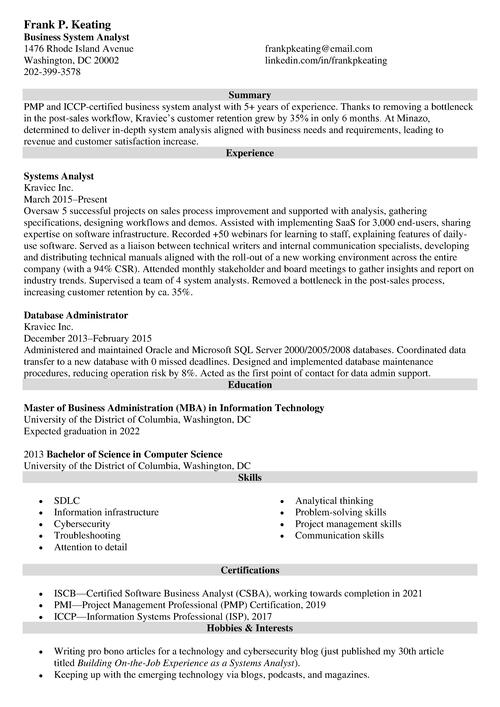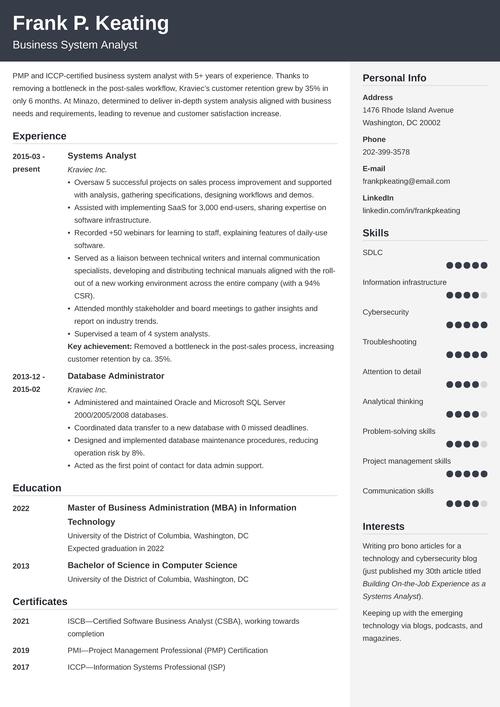
Business Systems Analyst Resume Sample & Keywords
Not used to seeing the whiteboard all white? With our business systems analyst resume guide, your resume will no longer show a blank page.
Do you sometimes look back to when you were still a kid and thought “artifacts” were rare items in gameplay?
Or, when you heard “backseat driver,” you didn’t immediately think of a product owner in your head?
Yeah, but—
Life gave you lemons, and you made lemonade.
Now impress the change control board of recruiters with a business systems analyst resume aligned to their KPIs.
This guide will show you:
- A business system analyst resume example better than 9 out of 10 other resumes.
- How to write an IT business systems analyst resume that will land you more interviews.
- Tips and examples of how to put skills and achievements on a business system analyst resume.
- How to describe your business systems analyst experience on a resume to get any job you want.
Here’s a business system analyst resume example made with our builder.
Want to save time and have your resume ready in 5 minutes? Try our resume builder. It’s fast and easy to use. Plus, you’ll get ready-made content to add with one click. See 20+ resume templates and create your resume here.
Sample resume made with our builder—See more resume examples here.
See other resume examples:
- System Analyst Resume Example
- Business Analyst Resume Example
- Business Intelligence Analyst Resume Example
- Business Resume Example
- Data Analyst Resume Example
- Data Engineer Resume Example
- DevOps Resume Example
- Entry-Level Business Analyst Resume Example
- IT Resume Example
- IT Manager Resume Example
- Microservices Resume Example
- Bioinformatics Resume Example
- Network Administrator Resume Example
- Solution Architect Resume Example
- System Administrator Resume Example
- 500+ Best Resume Examples
Business Systems Analyst Resume Sample
Frank P. Keating
Business System Analyst
1476 Rhode Island Avenue
Washington, DC 20002
202-399-3578
linkedin.com/in/frankpkeating
Summary
PMP and ICCP-certified business system analyst with 5+ years of experience. Thanks to removing a bottleneck in the post-sales workflow, Kraviec’s customer retention grew by 35% in only 6 months. At Minazo, determined to deliver in-depth system analysis aligned with business needs and requirements, leading to revenue and customer satisfaction increase.
Experience
Systems Analyst
Kraviec Inc.
March 2015–Present
- Oversaw 5 successful projects on sales process improvement and supported with analysis, gathering specifications, designing workflows and demos.
- Assisted with implementing SaaS for 3,000 end-users, sharing expertise on software infrastructure.
- Recorded +50 webinars for learning to staff, explaining features of daily-use software.
- Served as a liaison between technical writers and internal communication specialists, developing and distributing technical manuals aligned with the roll-out of a new working environment across the entire company (with a 94% CSR).
- Attended monthly stakeholder and board meetings to gather insights and report on industry trends.
- Supervised a team of 4 system analysts.
Key achievement: Removed a bottleneck in the post-sales process, increasing customer retention by ca. 35%.
Database Administrator
Kraviec Inc.
December 2013–February 2015
- Administered and maintained Oracle and Microsoft SQL Server 2000/2005/2008 databases.
- Coordinated data transfer to a new database with 0 missed deadlines.
- Designed and implemented database maintenance procedures, reducing operation risk by 8%.
- Acted as the first point of contact for data admin support.
Education
Master of Business Administration (MBA) in Information Technology
University of the District of Columbia, Washington, DC
Expected graduation in 2022
Bachelor of Science in Computer Science
University of the District of Columbia, Washington, DC
Graduated in 2013
Skills
- SDLC
- Information infrastructure
- Cybersecurity
- Troubleshooting
- Attention to detail
- Analytical thinking
- Problem-solving skills
- Project management skills
- Communication skills
Certifications
- ISCB—Certified Software Business Analyst (CSBA), working towards completion in 2021
- PMI—Project Management Professional (PMP) Certification, 2019
- ICCP—Information Systems Professional (ISP), 2017
Hobbies & Interests
- Writing pro bono articles for a technology and cybersecurity blog (just published my 30th article titled Building On-the-Job Experience as a Systems Analyst).
- Keeping up with the emerging technology via blogs, podcasts, and magazines.
Here’s a guide to writing a business system analyst resume, spearheading your chances at no extra cost:
1. Format Your Business Systems Analyst Resume Right
Imagine it’s a workflow you’re about to see to. First, you need to clean it up so that it delivers the wanted results. Start with the basics, which are formatting and organizing your resume structure. Then, move on to writing in the details about yourself, your relevant experience, and skills.
Eisenhower would say these belong to the urgent and important category:
- Resume design: professional and modern.
- Resume font: legible and ATS-friendly.
- Resume spacing: 1-1.15 points between lines.
- Resume margins: 1-inch margins on all sides.
- Resume bullet points: list your relevant experience, education details, and skills in a way that’s easy to scan.
- Resume length: unless you have more than 10 or 15 years of experience, don’t go over 1 page.
Hiring teams and Applicant Tracking Software got used to having the most recent achievements at the top of resumes, so to get lucky, go for a reverse-chronological resume format. It’s like a reverse-logic network. Does that ring a bell?
Oh, and save your resume file as PDF or Word, depending on what the recruiters want.
Once you’re done formatting, create such resume sections:
- Resume heading with your contact information
- Resume summary or objective
- Experience
- Education
- Skills
- Other (volunteering, certificates, conferences, hobbies & interests, etc.)
Now read on to fill them in.
Your job revolves around standards and improvements. See what the latter has to do with resumes: How To Write A Job-Winning Resume For A Job
2. List Achievements of an IT Business Systems Analyst
You try to find a flowchart the sales team was supposed to send directly to you.
“Got it!” you say and start digging.
A few minutes in Microsoft Visio and your head’s burning red from scratching and thinking, “That makes no sense.”
Sorry to disappoint; you’ll be in such situations a thousand times more. Your job is to show people how they need to do things to achieve their goals.
But—
You can’t have the recruiter say your application makes no sense to achieve yours, and they definitely won’t spend so much time on it.
To avoid such a fiasco, work your way through these action items one by one:
- Reread your job ad and mark resume keywords. Look for them in the role responsibilities and required and nice-to-have qualifications.
- Create an extensive list of your experience and skills to date.
- Using the STAR method, transform the report of responsibilities you just made into an Academy Awards gala of your achievements.
- Help yourself out with resume power words, and quantify as often as you can. Prove you completed your projects with desired results, especially when aiming for a senior business systems analyst job.
- Match your list with the employer requirements to leave only relevant experience on your resume.
It isn’t so hard, right?
Here’s a snippet of a job ad for a business systems analyst:
We’re looking for a business systems analyst who’ll:
- Lead implementation projects.
- Make recommendations based on trends and business standards.
- Boost efficiency through training and process improvements.
- Meet with clients to exchange industry knowledge.
Now see our examples of what we responded to such requirements:
Business System Analyst Resume
| RIGHT |
|---|
Systems Analyst Kraviec Inc. March 2015–Present
Key achievement: Removed a bottleneck in the post-sales process, increasing customer retention by ca. 35%. |
| WRONG |
|---|
Kraviec Inc., March 2015–Present
|
Holy cow.
Is it Peter Drucker’s resume? It might be.
Do you remember him saying, “if something can’t be measured, it can’t be managed”? You’d better!
Now you can see for yourself that numbers draw attention like crazy. They also prove you understood your KPIs and you delivered.
If you’re pursuing a junior business system analyst position, and have little to no work experience, worry not. It’s all about transferable skills for you.
Analyze the example below:
Entry-Level Business System Analyst Resume
| RIGHT |
|---|
Database Administrator Kraviec Inc. January 2014–February 2015
|
Project management will be a huge part of your job, but teams will know you for keeping deadlines rather than forwarding emails.
You’re an organized individual with attention to detail and effective communication skills, too.
Great job!
If you carry on with such a presentation of your qualifications and skills, you’ll get the gig.
Worried your experience looks like an ingredients list? Find more ways to prove yourself in our guide: Achievements For Your Resume
3. Take the Winning Position With Your Degree
You’ve always been the person who does 99% of the group project?
Yikes!
Even though you most likely didn’t appreciate taking leadership, now your engagement will be your leverage.
As a junior candidate, go hard and leave no stone unturned. Give away the details of:
- signing up for relevant coursework
- making the Dean’s list
- taking Honors classes
- having a high GPA (3.5 and higher)
- joining societies, student clubs, organizations, or volunteer groups.
If you have relevant work experience, you don’t need to go into the details of your educational background. Listing your highest degree, school, and graduation date are more than enough.
In both cases, make sure you spell out the degree.
Take a look at those examples:
IT Business Systems Analyst Resume
| RIGHT |
|---|
Master of Business Administration (MBA) in Information Technology University of the District of Columbia, Washington, DC Expected graduation in 2022
Bachelor of Science in Computer Science University of the District of Columbia, Washington, DC Graduated in 2013 |
It couldn’t be any simpler.
Junior Business System Analyst Resume
| RIGHT |
|---|
Honors Bachelor of Science in Information Technology University of the District of Columbia, Washington, DC Graduated in 2020
|
Recruiters will notice your actual efforts to learn the industry and appreciate you’re doing it out of interest.
Your business systems analyst resume is just the place to speak proudly about your achievements without the fear of being talked down by your peers.
If education makes most of your experience, move it up right after the resume objective section. Read more about it in this guide: Education On A Resume
When making a resume in our builder, drag & drop bullet points, skills, and auto-fill the boring stuff. Spell check? Check. Start building a professional resume template here for free.
When you’re done, Zety’s resume builder will score your resume and tell you exactly how to make it better.
4. What Skills Does a Business System Analyst Need?
A mix of soft and hard skills—that’s for sure and certain.
You’ll be dealing with lots of technical standards, data and industry analysis, and troubleshooting.
Developed communication skills to explain how the software works to mere mortals and techthusiasts are a must.
On top of that, you’ll be a project manager with plenty of challenges and tight deadlines.
Phew.
Things are getting pretty serious.
Now see a breakdown list of skills classified by type for a business systems analyst resume:
Business Systems Analyst Resume Skills
Soft Skills | |
1 | |
2 | |
3 | |
4 | |
5 | |
6 | |
7 | |
8 | |
9 | |
10 | |
11 | Attention to detail |
Hard Skills | |
1 | Product knowledge |
2 | Product development |
3 | |
4 | Performance evaluation |
5 | Technical writing |
6 | System integration |
7 | Data and cloud security |
8 | System migration |
9 | |
10 | |
11 | Data visualization |
Those aren’t for you to only copy and paste.
You need to give evidence of your skillset instead of naming it.
Why?
Up to this point, you should’ve realized the job ad is your Wiliam Dow’s “PMC Bible.”
In the skill section, you should, too, use resume keywords. However, don’t list just any skills. Your resume should max out the relevant skills; those, which the hiring manager requires.
To get a high ATS resume score, make sure your relevant skills are peppered all over your resume, meaning they appear in your work history, skills, and additional sections, too.
Now see what proves (1) attention to detail, (2) project management, and (3) communication skills:
Business System Analyst Resume [Examples of Skills]
| Right |
|---|
(1) Spotted and implemented a recovery plan for a bottleneck, increasing customer retention rate by 35% in the end. (2) Led 5 projects from start to finish with on-time product delivery. (3) Wrote technical manuals and FAQs, leading to over 96% successful logons. |
In case you’re just kicking off things, the most important for you will be soft skills.
Whether you learned something at school, doing odd jobs for friends and family, or volunteering, you’re free to transform that into employability skills. Just remember to stick to the job ad.
Entry-Level Business System Analyst Resume [Examples of Skills]
| Right |
|---|
|
We bet you now have a bunch of ideas of your own.
How much of your skills should soft or hard skills take? You can find that out in our guide: What Skills Do Well On A Resume: 99+ Examples
5. Show Your Qualifications for a Business Systems Analyst
If you want to impress your hiring manager, you need to be like Bruce Lee in Enter the Dragon.
Do you have the guts?
For starters, you can say you’ve got a black belt in Six Sigma. A one in karate will also do.
Intrigue the hiring team by being unpredictable and add other resume sections to what’s standard. Being an everyman in a job hunt is a crime.
Here are some ideas for additional sections:
- Awards (They fit perfectly as a bullet point in your work experience, too.)
- Volunteering
- Certifications and licenses
- Projects as part of freelancing, regular work, or academic
- Publications
- Languages
- Hobbies and interests
For the role of an IT business systems analyst, it’ll be best to add the certifications you hold or work towards, examples of projects you did, or publications. They all correspond with the desired qualifications.
Business Systems Analyst Resume Sample
| Right |
|---|
Certifications
Hobbies & Interests
|
| Wrong |
|---|
Certificates: ISCB, PMI, ICCP
Hobbies: Playing video games and traveling |
You shouldn’t lie on your resume. If you haven’t finished a course yet, don’t say that you did. And—
Stay relevant. Traveling and playing Mortal Kombat is fun, sure, but it has little to do with the job you want.
Junior Business Systems Analyst Resume Examples
| Right |
|---|
Volunteering
Hobbies & Interests
|
Perhaps those aren’t black belts in Six Sigma nor karate, but your employer won’t expect that you have them.
You’ll get your bonus points for making the time for extracurricular activities and sharing your enthusiasm for technology.
As a fan of in-depth analysis, make use of this guide: Good Things To Include In A Resume
6. Condense Your Career Highlights in the Resume Summary or Resume Objective
Now—
You’d call it a burst point.
We call it summary or objective. They come last to write, even though they appear first on all resumes. So, which one do you choose?
A resume summary is a summary of your experience, key qualifications, and skills. (Now you know why you should write it last?) Your job will be so much easier if you get your work history and skill sections sorted, and only then start writing the summary.
If you prefer a bullet list over a short paragraph, you can choose to write a summary of qualifications.
Writing a resume objective is recommended to entry-level candidates because it shows your skillset and motivation.
Follow this formula to write your resume summary:
[Adjective(s)/strong character trait(s)][your job title][your experience]. Eager to support/help/assist/etc. [company name][what you want to help the employer achieve and how you want to do it]. [your key achievement(s)].
And see to these two examples:
Business Systems Analyst Resume Summary
| Right |
|---|
PMP and ICCP-certified business system analyst with 5+ years of experience. At Minazo, determined to deliver in-depth system analysis aligned with business needs and requirements, leading to revenue and customer satisfaction increase. Thanks to removing a bottleneck in the post-sales workflow, Kraviec’s customer retention grew by 35% in only 6 months. |
| Wrong |
|---|
A business system analyst with more than 5 years of experience. I’ll make sure to perform a system analysis that’s aligned with Minazo’s business needs. I have already taken part in a number of process improvement projects, and I’m eager to share my expertise in information infrastructure. |
As with your work history sections, you need to use powerful words and a language of achievements. Don’t mind the grammar and get rid of all “Is.”
The resume summary is the first thing recruiters see when scanning a resume, so make sure you stand out and encourage them to keep reading.
To all aspiring business system analysts, we got you covered. Here’s a template for a resume objective:
[Profession/job title] with [identified skills]. Seeking a position as a/an [position to which you’re applying], to [your offer about how you want to help your employer].
See how it works in an example:
Resume Objective for a Business Systems Analyst
| Right |
|---|
BS in computer science with proven practical leadership, organizational and excellent communication skills. Seeking to deliver meticulous attention to detail as an entry-level business system analyst at Minazo. |
| Wrong |
|---|
I’m looking for an opportunity as an entry-level business systems analyst at Minazo. Finished a bachelor degree in computer science recently, and I’m trying to get more experience in the field. |
Boo.
There are hundreds of graduates looking for better opportunities, so you must move to the winning position with your resume objective. Prove you’ve got what it takes to go down the steep learning curve and not fall behind.
See more of Best Resume Writing Tips
7. Lay Bare Your Key Achievements in the Cover Letter
If you haven’t included writing a cover letter in your network diagram, then you made a huge mistake. What happened to your risk mitigation skill, huh?
45% of candidates get rejected only because there’s nothing attached to the job application but a resume.
Conclusion? You need to write a cover letter to boost your performance metrics.
Here’s a simple writing strategy made to order:
- Duplicate the style of your resume into the cover letter.
- Include your contact details in the cover letter heading.
- A gripping introduction, two stirring paragraphs in the body, and a formal closing add up to the cover letter structure.
- Speak about your achievements and elaborate on your qualifications.
- As you tailor your resume to the job description, work resume keywords in your cover letter paragraphs, too.
- If you keep an ace up your sleeve, don’t hide it. Write a postscript to let your resume land safely on the deck.
To dot the i’s and cross the t’s—you can add IT business systems analyst salary requirements in your cover letter, but only when you’re asked. And if you do, be sure as hell you did your research.
Make sure your cover letter isn’t generic. Read how to: How To Build A Cover Letter
Plus, a great cover letter that matches your resume will give you an advantage over other candidates. You can write it in our cover letter builder here. Here's what it may look like:
See more cover letter templates and start writing.
Key Takeaways
Now’s the time for some lessons learned:
- The format of your resume is important. It holds everything together.
- Work experience isn’t a list of responsibilities and roles you took, but a track record of your achievements and qualifications relevant to the job.
- Your degree does tell you’re an asset, especially in entry-level applications.
- Don’t name your skills. Prove them.
- Additional sections are great to boast about your extra—but still relevant—activities.
- Write the so-called About Me section in the resume summary or resume objective.
- Be your hero when writing a cover letter.
You’re safe to say—
I’ve done it!
Now, we’d love to hear from you:
- What are the biggest challenges of writing a resume?
- Which part do you struggle with the most?
- What’s your opinion on cover letters?
Let’s chat below in the comments, and thanks for reading!




